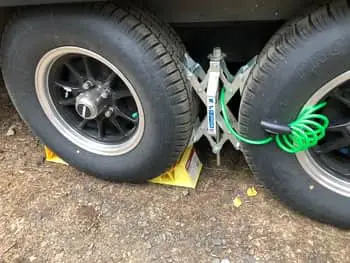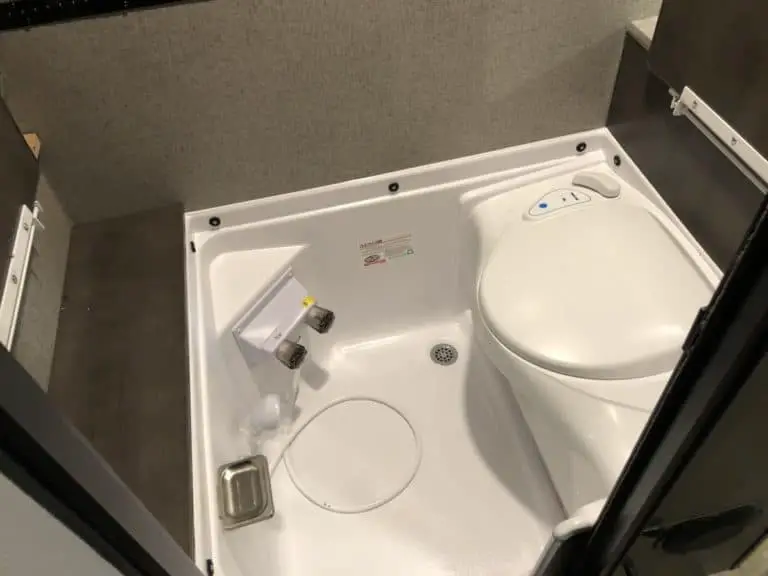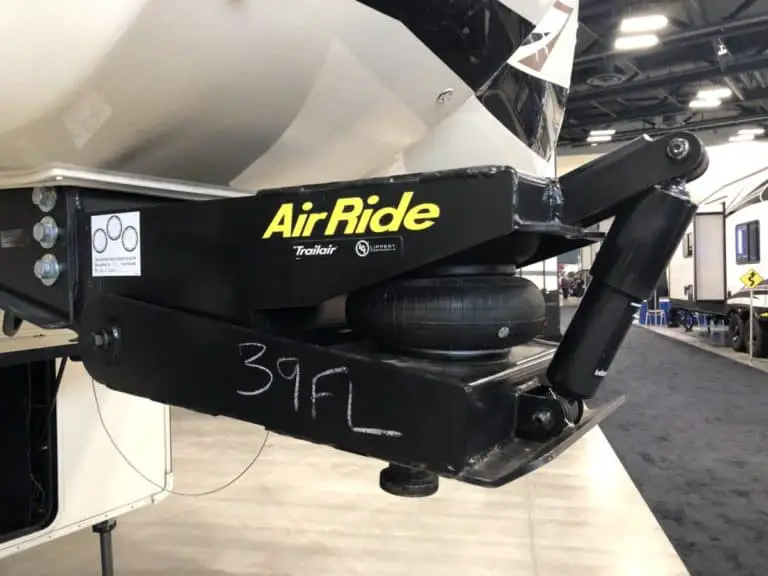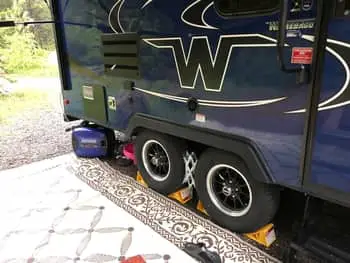Do You Need to Balance Travel Trailer Tires? Expert Tips and Insights
When planning a trip with your travel trailer, it’s essential to ensure that all components are in good working order, including the tires. Balancing your travel trailer tires is an important aspect of maintaining optimal performance and safety during your travels. This article will discuss the reasons for balancing trailer tires, the potential consequences of neglecting this task, and how to ensure proper balancing.
Travel trailer tires need to be balanced as an unbalanced tire can cause unnecessary vibration, premature wear, and damage to your axle bearings that can lead in failure. An unbalanced tire will cause more heat which can lead to a catastrophic blowout. Most tire dealers have the ability to balance your RV tires.
Balancing travel trailer tires helps to evenly distribute the weight of the trailer, preventing uneven wear, and prolonging tire lifespan. Unbalanced tires can lead to excessive vibration, causing an uncomfortable ride, additional stress on the suspension system, and even accidents. Furthermore, well-balanced tires promote fuel efficiency and a smoother driving experience.
Understanding the importance of balanced tires for your travel trailer is crucial for a safe and enjoyable trip. In the following sections, we will discuss methods for balancing, the signs of unbalanced tires, and when to seek professional assistance. Being proactive in addressing tire balance will contribute to a successful adventure on the road.
You may still be asking yourself if you should balance trailer tires, but let me assure you that you NEED to do this.
Importance of Balancing Travel Trailer Tires
Do you really need to balance your travel trailer tires? The tires on your travel trailer are your lifeline when traveling. The health of your tires is very important, as a blowout could leave you stranded in a remote area.
Tires on vehicles need to be balanced as they are a rotating mass moving at high speeds. A small off balance of weight can change the force that is applied to that one area of the tire causing a tire to vibrate or even bounce at certain speeds. On a travel trailer, this can lead to sway, loss of traction, or the feeling of being uncontrolled.
With a tire bouncing around unbalanced, you may lose traction with the road and cause erratic behavior from your trailer. Also if you lose contact with the road surface, this can enhance sway on your trailer.
Safety and Performance
Properly balancing your travel trailer tires is crucial for ensuring the safety and performance of your RV. Unbalanced tires can cause vibrations, impairing your ability to control the vehicle effectively.
This increases the risk of accidents and can make your journey more challenging. Balanced tires provide better traction on various road conditions and ensure that your wheels are working in unison for a smooth driving experience.
Unbalanced tires can also lead to premature blowouts. Another cause of a blowout can be an unlevel trailer while towing, read about it in our guide here.
Longevity and Fuel Efficiency
Balancing your trailer tires can also contribute to their longevity, as it prevents uneven wear on the tread. When tires are unbalanced, one area of the tire may wear down faster than the rest, leading to a need for earlier replacement. Keeping your tires balanced also improves fuel efficiency, as properly balanced wheels require less energy to rotate.
This means that your travel trailer will consume less fuel, allowing you to save money in the long run.
Comfort and Handling
A smooth ride significantly impacts your comfort when traveling in an RV. When tires are balanced, you will experience fewer vibrations as you drive. This means a more comfortable journey for you and your passengers. Additionally, balanced tires improve handling, making it easier for you to navigate tight turns and maneuver your travel trailer in various situations.
Signs of Unbalanced Tires
Excessive Vibrations
If you experience excessive vibrations while towing your travel trailer, it could be a sign of unbalanced tires. Unbalanced tires can cause noticeable sway and wobble, making it challenging to maintain control of your trailer on the road. Reduced stability can increase the risk of accidents, so it’s vital to address this issue promptly.
Unbalanced tires cause vibration which can rattle rivets, screws, and other items loose on your expensive trailer. Your travel trailer already has enough vibration and earthquake like movement so adding an unbalanced tire can further road damage on the vehicle.
Premature Wear and Tear
Unbalanced tires often lead to uneven wear patterns on your travel trailer tires. This premature wear and tear can result in needing to replace your tires sooner than expected, costing you both time and money. By regularly checking your tires for uneven wear, you can detect unbalanced tires early and take corrective action before the issue escalates.
Damage to Suspension and Components
When your travel trailer tires are unbalanced, it puts additional stress on your trailer’s suspension system and other components. Over time, this extra strain can lead to increased wear and damage to parts such as bearings, axles, and springs.
Keeping your tires properly balanced can help you avoid costly repairs and extend the life of your travel trailer’s components.
Balancing Process and Techniques
Static and Dynamic Balancing
To balance your travel trailer tires, you need to understand the differences between static and dynamic balancing. Static balancing ensures the tire remains stationary with no heavy spots when suspended vertically on the axle.
It requires adjusting the tire weight around the center of the bearing to counteract centrifugal force.
Dynamic balancing, on the other hand, involves even distribution of weight around the entire tire circumference. It prevents any side-to-side motion or wobbling while the trailer is in motion, ensuring a smoother ride.
Wheel Weights
Wheel weights are essential tools for achieving proper tire balance. They come in different materials, such as steel, zinc, or lead, and are available in adhesive or clip-on styles. To use wheel weights:
- Identify the heavy spots: Spin the tire and identify the heavy section, which should stop at the bottom.
- Apply the wheel weights: Place the wheel weights opposite the heavy section on the tire’s inner and outer edges, ensuring a uniform distribution of weight.
Professional Tips for Balancing
Here are some professional tips to help you balance your travel trailer tires effectively:
- Check the axle and bearings: Ensure the axle is in good condition and the bearings are properly greased to avoid any balance-related issues.
- Use a tire balancing machine: These machines provide precision and accuracy when measuring tire balance, making it easier to apply the appropriate wheel weights.
- Rotate the tires: Regular tire rotation can help in maintaining even wear, which in turn, keeps balance and handling optimal.
Choosing the Right Trailer Tires

Manufacturer Recommendations
When selecting trailer tires, it’s essential to follow the manufacturer’s recommendations. Trailer tire manufacturers have specific guidelines for size, load capacity, and other properties that ensure the tires support your towing activities. Always check your trailer’s owner’s manual or consult with the manufacturer to confirm the tires meet their standards for safety and performance.
Understanding Tire Ratings and Specifications
In addition to the manufacturer’s recommendations, it’s crucial to understand tire ratings and specifications. These include load capacity, speed rating, and inflation pressure. Load capacity is the maximum weight the tire can support, while speed rating indicates the maximum speed the tire can handle safely. Inflation pressure refers to the appropriate amount of air pressure that should be maintained in the tire for optimal performance.
Consider the following factors when choosing trailer tires:
- Age of the tire: Tires have a lifespan, and it’s generally not recommended to use a tire that’s more than five years old. Look for the “DOT” number on the side of the tire, which provides information on its production date. This will help you avoid purchasing or using aged tires that may not be suitable for safe towing.
- Tire type: Radial or bias-ply tires are commonly used for trailers. Radial tires often provide better heat dissipation and a smoother ride, while bias-ply tires are more durable with stronger sidewalls. Choose the type of tire that meets your specific towing needs and preferences.
- Proper inflation: Maintaining the correct air pressure in your tires is essential to prolong their lifespan and ensure a safe towing experience. Underinflated tires can cause poor handling, reduced fuel efficiency, and increased tire wear. Overinflated tires can cause a harsh ride and uneven tire wear. Always follow the manufacturer’s inflation recommendations.
By following these guidelines and understanding tire ratings and specifications, you can confidently select the right tires for your travel trailer, ensuring safe and enjoyable towing experiences.
Tire Maintenance and Inspection
Regular Checks for Damage
Regularly inspect your travel trailer tires for any damages that may have occurred during use. Look for signs of punctures, cracks, or bulges. Excessive heat can cause the rubber to become more susceptible to damage, so pay close attention to your tires after long trips or during hot weather. Examine the tread for uneven wear, which might indicate an issue with your trailer’s alignment.
By promptly addressing these issues, you can prevent a potential tire blowout.
Proper Inflation and Pressure
Maintaining the correct tire pressure is crucial for the lifespan and performance of your travel trailer tires. Over- or under-inflated tires can lead to uneven wear, reduced fuel efficiency, and a greater risk of tire blowout. Check your tire pressure before each trip, using a reliable tire pressure gauge, and adjust the pressure according to the manufacturer’s recommendations. Remember that tire pressure can change due to temperature fluctuations, so make sure to check the pressure when your tires are cool or have not been recently driven.
- Over-inflated tires: May cause a rougher ride, increased wear on the center of the tread, and reduced traction.
- Under-inflated tires: Can lead to increased heat, reduced fuel efficiency, faster tread wear, and a higher risk of blowout.
Monitoring Tire Aging
Even if your tires appear in good condition, it’s essential to monitor their age. Tires degrade naturally over time, and older tires are more prone to blowouts. As a general rule, replace your travel trailer tires every five to seven years, regardless of how they look visually. You can find the tire’s age, indicated by the DOT code on its sidewall. This code reveals the week and year of manufacture, allowing you to determine when it’s time for a replacement. Always check the age of your tires during maintenance and inspections to ensure your travel trailer is safe and roadworthy.
Common Questions
To further assist you, we’ve compiled a list of frequently asked questions and expert answers related to balancing travel trailer tires.
1. How often should I balance my travel trailer tires?
Experts recommend balancing your travel trailer tires every 12,000 to 15,000 miles, or when installing new tires. However, if you experience vibrations or uneven tire wear, it’s essential to get them checked and balanced sooner.
2. Can I balance my travel trailer tires myself?
While it’s possible to balance your tires at home using a portable tire balancer, experts advise seeking professional help for the best results. Tire service centers have specialized equipment and trained technicians who can ensure a precise and accurate balance.
3. Is it necessary to balance all four travel trailer tires at the same time?
Balancing all four tires simultaneously is the best practice. However, if only one tire exhibits signs of uneven wear or vibration issues, you can choose to have it balanced separately. It’s essential to consult with a tire expert to determine the appropriate course of action.
4. What happens if I don’t balance my travel trailer tires?
Neglecting proper tire balancing can result in several issues, such as uneven tire wear, vibrations, poor fuel efficiency, and stress on your vehicle’s suspension components. In the long run, this can lead to costly repairs and decreased tire lifespan.
Remember, whether you are an experienced or first-time travel trailer owner, prioritizing tire balancing is crucial to ensure a safe and comfortable journey.
Conclusion
Travel trailer tires play a crucial role in ensuring a safe and comfortable trip for you and your family. Balancing trailer tires is an essential step in maintaining their longevity and performance. It helps in reducing vibrations, improves fuel efficiency, and ultimately reduces wear and tear on your trailer’s suspension components.
While you might think skipping tire balancing may not cause any significant harm, doing so can jeopardize your safety on the road. Unbalanced tires can lead to accidents due to poor handling, and may also cause uneven and quick wear on your tires.
Regular inspections and routine maintenance are crucial for maintaining your travel trailer tires in optimal condition. By addressing tire issues promptly, you can avoid potential hazards and ensure a smoother, safer journey on your adventures.
Remember that each trailer and tire setup is different; you should always refer to your owner’s manual for specific guidelines on your tire maintenance. When in doubt, don’t hesitate to consult a professional technician to assist you in balancing your trailer tires and addressing any other concerns.
In summary, balancing your travel trailer tires is not a step to be overlooked. By taking the time to ensure your tires are well-balanced, your travels will be safer, more comfortable, and ultimately more enjoyable.
Frequently Asked Questions
Are trailer tires normally balanced?
Yes, trailer tires are generally balanced when you purchase them new. However, over time, the balance can be affected by various factors such as wear and uneven weight distribution. When you notice any symptoms of unbalanced tires or are replacing your tires, it’s a good idea to have them balanced.
Is balancing necessary for single axle trailers?
Balancing is beneficial for single axle trailers, as it can improve the overall performance and increase the lifespan of the tires. Unbalanced single axle trailers can cause uneven tire wear and put additional stress on the trailer’s suspension components.
Should boat trailer tires be balanced?
Yes, boat trailer tires should ideally be balanced. Doing so can help in providing a smoother towing experience and reduces the risk of uneven tire wear, poor handling, and potential damage to the trailer’s components.
How can I tell if my trailer tires are out of balance?
Signs that your trailer tires may be out of balance include uneven tire wear, trailer sway or vibrations at specific speeds, and increased wear on trailer suspension components. If you experience any of these symptoms, consider having your tires inspected and balanced by a professional.
Is tire balancing required for horse trailers?
Balancing tires on a horse trailer is highly recommended. Horse trailers, like any other trailers, can suffer from uneven tire wear and vibrations if the tires are out of balance. Proper tire balancing will ensure a smoother ride, which is ideal for keeping your horses safe and comfortable during transport.
What can happen if I don’t balance my trailer tires?
Not balancing your trailer tires can lead to uneven tire wear, vibrations, poor handling, and increased stress on the trailer’s suspension components. In the long run, unbalanced tires can also decrease the overall lifespan of your tires, resulting in frequent replacements and increased costs.
Do Utility Trailers need to be balanced?
Yes, utility trailers should have their tires balanced for optimal performance. Just like other types of trailers, balancing the tires on a utility trailer can help prevent uneven tire wear, maintain stability, and protect the trailer’s suspension components, ensuring a smooth and safe towing experience.
When tire shopping for your travel trailer, your tire dealer may tell you that trailer tires do not be balanced. This may be true for some lightweight trailers, or utility trailers only used for short amount of times at low speeds, but your travel trailer which runs at high speeds for many miles will be different. Your travel trailer should be keep in the best running shape as possible, which requires its tires to be balanced.
Be the first to be notified about FREE tips, hints, coupon codes, and email-exclusive information. All for FREE!












